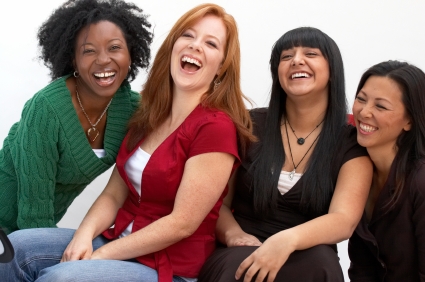by Whoa-man
Whoa-man is a long-time fan of Exponent II. She was introduced to the community by some of the founding mothers while she was working on her PhD in Boston and has been grateful ever since. She just gave birth to her first child and is trying to figure out the work/life balance.

What image comes into your head when you think of the word feminist? For some it is a baby-hating red power suit wearing bra burning man-eater. For others it is a revolutionary suffragette handcuffed to her cause and being threatened by egomaniac law enforcers with raised night sticks (pun intended). For most it is a hardened serious person described with words such as: bitter, cynical, critical, and/or bitchy.
Even for ardent feminists the word doesn’t usually connote a light or funny person. However, this idea is completely contrary to most of the feminists I know. The feminists I know are silly, happy, loquacious, adventurous, easy to smile, gregarious women who do not take themselves too seriously. Don’t get me wrong, they take issues about female inequality and sexism very seriously, but themselves, not so much.
The feminist I know are hilarious, irreverent women who know how to have a good time. When we get together it is more likely that we are laughing rather than screaming. Cackling before cajoling. Giggling more than marching. Bonding instead of tearing each other down.
One of my feminist friends tells stories that make you almost pee your pants. Another is so quick to laugh it’s infectious. Another says the most outrageous things you wonder how she makes it through her day without offending or befriending everyone she meets. In fact, I have never met the stereotypical bitter, single-minded, power hungry feminist. At least not one I didn’t instantly like because she was also fun.
Me, I’m a goofy feminist. While I have my serious side, I can be a capable mother, caring wife, fastidious career woman, and responsible calling magnifier. I’m also the foot-in-my-mouth, falls on the floor laughing, do a little jig, clap my hands too fast and too loud in excitement, face, noise, and smell making, goofy person. I can probably write an embarrassing story for every week of my entire life (and yes, they begin very early). I just do goofy things. It is a quintessential part of me just as much as my feminism. They are not mutually exclusive.
Sure I get feisty about women’s rights. I talk passionately. I feel enraged. I cannot tolerate or feel complicit in injustice. But for every time I cry out in frustration, I’ve laughed at the perpetrators 10 times more. For example, we have this counselor in the bishopric who is outrageous. He attends every activity (even those not in his stewardship), has opinions about every decision (and voices them), and oversees everything from the folding of the chairs to whether or not next year’s meeting (365 days away) will be a potluck or not.
This guy is crazy. While no one directly confronts him, tells him to back off, or asserts their rights in the traditionally feminist sense, every woman that I know in the ward—feminist or not—secretly laughs or tells jokes about him. I hope I’m not divulging “The Secret Life of Bee-hives” or something, and I know that gossip is “bad,” but maybe that is where we claim our power. Maybe our laughter is a tool for recognizing the absurdity of injustice, our way of subverting structural violence. Maybe humor protects our unhealed wounds. Maybe that is why all the feminists I know are funny.
So my question to you is: Is there really that feminist archetype out there? Do we take ourselves too seriously or do we just have a serious public relations problem?






20 Responses
When I do things specifically motivated by my feminism those are almost always, very serious, not-fun things. And it is only when I do those things that other people will look at me and say to themselves “she’s a feminist.”
Here’s an idea: Maybe we should make a series of commercials, featuring attractive, successful people saying things like “I’m Starfoxy, I’m a mother of two, I love MST3K, I’m a knitter, and I’m a feminist.”
love mst3k!!
Love it Starfoxy!
I think if there is anything to Feminists coming across as funny, it’s in response to the overly serious stereotype you mention in the beginning, Whoa-man. Maybe we’re subconsciously trying to show people that we’re not what they assume.
As far as the stereotype goes, it may be that the breakthough feminist wanted to be taken seriously, therefore guarded themselves in public. Would people have valued their opinions if they were giggly? I can’t see Gloria Steinum reacting to a real gut buster. People have long memories and when they think of “feminists” they think of our forebears. I think we, today, are silly because we are joyful and hopeful. Crabby people have a hard time being silly.
Okay, I LOVE your second to last paragraph, particularly this:
“Maybe our laughter is a tool for recognizing the absurdity of injustice, our way of subverting structural violence. Maybe humor protects our unhealed wounds. Maybe that is why all the feminists I know are funny.”
One of the most prominent early feminist stereotypes/caricatures is the “hag” in fairy tales — an unmarried, independent-thinking framed as undesirable and dangerous to young, virtuous maidens!
(As for me, my students find me funnier than adults — but then, I rarely stand on desks and sing songs about messy cubbies in front of “tall people.”)
“Maybe our laughter is a tool for recognizing the absurdity of injustice, our way of subverting structural violence. Maybe humor protects our unhealed wounds. Maybe that is why all the feminists I know are funny.”
I think that is true. Humor is indeed subversive. I just did a google search of ‘humor, feminism, subversive’ and found a book called “Laughing Feminism: Subversive Comedy in Frances Burney, Maria Edgeworth, and Jane Austen.”
The book is described as showing how Austen, etc. ‘used humour to challenge women’s subordinate position by exposing the irrationality of patriarchal discourse.’ Do we Mormon feminists do that? I think we do when we get together. I think maybe we should do it more when we write.
Thanks for the great post, Whoa-man!
Yay, another opportunity to link to the Jane Austin Fight Club! Go sisters!
http://www.youtube.com/watch?v=r2PM0om2El8
“For example, we have this counselor in the bishopric who is outrageous. He attends every activity (even those not in his stewardship), has opinions about every decision (and voices them), and oversees everything from the folding of the chairs to whether or not next year’s meeting (365 days away) will be a potluck or not.”
Uhh…Whoa-man, are you me? 🙂 I seriously could have written this EXACT same sentence, including the whole planning-a-potluck-365-days-in-advance. Either you are in my ward or there are two too many counselors who need too much warning for a potluck to which they are not invited.
Starfoxy, I agree completely. I’m a Mormon and I like Mormons so much more after watching those videos. Maybe we should seriously look into changing feminist PR. Also, I am often only called the “f” word (feminist) when I am passionate about some injustice in particular. The rest of the time I am still a feminist, but no one seems to care about it when I make them laugh.
Corktree I and Two of Three, I think you are right. Just like any underrepresented minority in power, you have to tread carefully to be taken seriously. It is interesting to me that female politicians are often critiqued for not having a sense of humor but then not taken seriously if they do.
Deborah nice link and I wish you were my teacher! I know that humor helps me a lot with church problems in particular because I get frustrating feeling like I have very little control or decision making power over much of my experiences. As such, I tend to use humor to protect myself.
Caroline fantastic book suggestion! I adore many female comedians and think they have done a lot for feminism in ways that sometimes go unsung.
Susan I agree. There are just way too many counselors 🙂 he he.
The story of your bishopric member makes me think of old slave folk tales that I’ve been reading a bit about lately.
Slaves in the US had a strong tradition of story-telling about small, vulnerable, but wily animals (like foxes) defeating big, strong, violent but dumb animals (like bears). The oppressed creature would be in danger, but would overcome the oppressor, through cunning, strategem, and intelligence. And the stories usually use a great deal of humor to make the big, dumb oppressor look really terrible. In their fables, slaves would laugh at their oppressors as comical buffoons.
Laughter doesn’t necessarily change our situation, but I do think it changes our hearts, and prepares us to do the work necessary to overthrow our oppression.
Do we take ourselves too seriously?
The recent “Sugar and Spice” post seemed just a touch too extreme – an example of overthinking a “feminist” concern. I don’t know. Maybe it’s better not to care about image. It rapidly disintegrates into an argument based on opinion and perspective. Who cares if your kids see traditional gender roles in the home? And who cares if some parents want to raise their kids gender neutral? (Obviously I should have commented on that other post. It took me a few days, but I finally came up with an opinion about it!)
Nat Kelly–that is EXACTLY what I was thinking. It’s a resource for the oppressed…and while I enjoy a good laugh as well as the next person, I hope that we won’t always be in need of coping mechanisms in regard to patriarchy.
I think individual senses of humor are different facet of personality than the jokes that need to be told to lighten the oppression.
This makes me sound like I don’t like laughing. I do.
I’ve been thinking about this more since it originally went up, and I have two more thoughts. One is that, of all the people in the world, feminists are most often the one’s who are most likely to be aware of all the ways in which women’s voices aren’t taken seriously. We are most attuned to the proverbial pats on the head, and patronization. We are also most aware of how the giggling airhead stereotype helps to perpetuate the assumption that women are vapid. I have, what I perceive to be a bubbly airhead sounding name, and a naturally high pitched, childish voice. I’ve often wondered if I’ve been overcompensating for those things and have adopted an overly serious and dour disposition. I can’t take it for granted that my opinions will be taken seriously when it matters, so I have to create and guard a reputation for being thoughtful and well informed. I think that feminists on the whole may actually be more dour than other women, especially around people that they suspect will be less likely to respect their opinions after being seen giggling.
On the other hand I think the dour stereotype may be a form of policing. Create the myth of the humorless feminist- turn her into the worst possible thing to encounter and bring up this specter every time any woman anywhere is upset about anything. Then, like magic, every time someone says something sexist, or patronizes a woman, or whatever and gets called out on it they claim it was a joke! This forces her to either laugh it off, or risk being accused of being a humorless harpy feminist- which no one wants to be because they just are so terrible.
I’m inclined to say it’s the second because the people most invested in proclaiming feminists to be humorless are the very people who feel the most threatened by feminists.
Love this post and your name, Whoa-man 🙂
Our family has been finding humor in the following testimony my brother-in-law heard this week (because otherwise, we’d cry):
A woman in his ward did the Church history tour trip and went to a few of the buildings run by the Community of Christ. Her testimony then proceeded to say how much the Community of the Christ got wrong. The coup de grace? “And, do you know what they’ve done?! They’ve denied women Relief Society by giving them the Priesthood.”
Oh the horror! 😀 Hilarious, Emily!
I really like this post, Whoa-man. I agree that there may be a PR problem, where people perceive feminists as those who are always waiting with bated breath, hoping for the chance to jump in and get offended at something no “normal” person would find offensive.
But I agree with you. I guess the only place I really hang out with feminists is online (other than gatherings with my sisters and the occasional bloggersnacker), and the only ones I know are Mormon blogging feminists, but I agree with you that this stereotype seems completely false for this group. I think I’m echoing what at least a couple of other people have already said, but I think there’s great power in being able to laugh at things. Particularly at yourself. It suggests an ability to step outside yourself and imagine how others might see you that I think is really helpful.